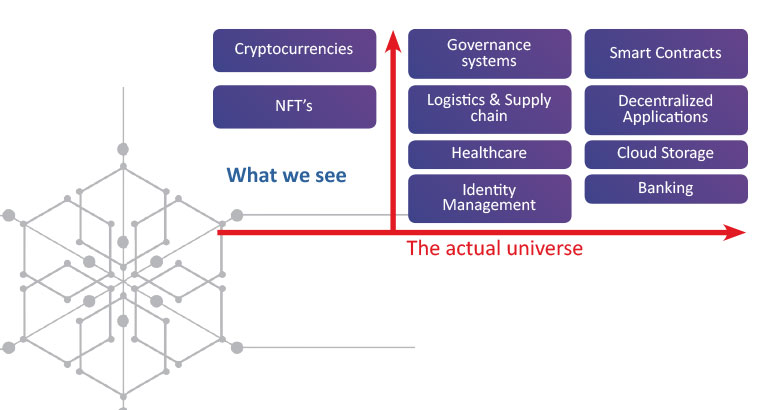
This month, Pria Masson guides us through the concept of blockchain and what it can do for so many businesses.
With the collapse of FTX, cryptocurrencies are in the media for all the wrong reasons. Among these many pieces, there was a large number that seemed to assume cryptocurrencies and blockchain, the technology behind cryptocurrencies, were both at risk. However, this could not be further from the truth because blockchain is the future. Cryptocurrencies, Bitcoin and NFT’s – these are merely small applications of blockchain technology.
What is blockchain technology?
Blockchain technology, at its end, is an application of Distributed Ledge Technology (DLT), which records the transaction of assets and their details in multiple places at the same time. In the ledger, each node processes and verifies each item. This then creates a record and a consensus on its accuracy. These can be used to create static records like a registry as well as a dynamic financial record.
A blockchain is then a distributed ledger that tracks a shared database across multiple users. It is primarily concerned with the decentralised storage of information, consensus and accuracy of particular digital assets. With this, its application is far beyond cryptocurrencies and NFT’s. It has the potential to replace business models which rely on third party and centralised systems for verification and trust.
What are the types of blockchain?
Blockchains can be either public or private. Public blockchains do not need permissions and anyone can join the network or participate in the blockchain. Most of the crypto systems like Bitcoin, Ethereum etc. are based on the anonymous public blockchain system. Private blockchains on the other hand, are invitation only and run by a single entity. For instance, the Linux Foundation created the Hyperledger projects to support confidential commercial transactions.
The type of system used depends on the ultimate aim of the system and the “somewhere in between” or hybrid options are also emerging in some areas. For these, there is a usually one central authority that controls the system but there are some permissionless processes involved. The IBM Food Trust is one such system that uses a hybrid system to connect participants across the food supply chain through a permissioned, permanent and shared record of food system data .
 Which industries have potential uses for blockchain?
Which industries have potential uses for blockchain?
Blockchain also has tremendous potential to help governance systems, to streamline and track logistics, healthcare, banking and other sectors. It can even help track climate change better.
Supply chain management is one area where blockchain can play a pivotal role. For instance, the system can track a crop right back to the farm where it was grown while keeping a permanent record of every transaction along the way.
Blockchain technology is increasingly used and essential for smart contracts and in database systems. The technology allows for the automation of agreements to be executed without the involvement of a third party. Through blockchain systems, self-executing components like triggers and stored procedures can be implemented which cannot be undone. This makes it a system of choice for smart contracts.
Smart contracts don’t only refer to cryptocurrencies and financial contracts. In healthcare, blockchain can help patients and doctors securely transfer medical information. The contracts can establish the parameters of what data can be shared. Even in the music industry, smart contracts have been used by Mediachain wherein it allows for decentralised, transparent contracts with artists. Mediachain was acquired by Spotify in 2017 to solve its attribution problem.
What’s next?
The uses of blockchain appear to be across sectors. It solves the problem of manipulated data, of middlemen and of verification system errors. It’s a new tool that will allow us to have the data we need, to track what we need and to find the problems exactly where they are based. The question then is more “life-like” than we realise – if we have the data, what we need is the knowledge to sift the big problems from the small and to perhaps learn to live with the problems that are paper-cuts. The danger is in thinking that every tiny hole needs our full attention. Too much information can give a false sense of control. It’s early days for this technology; time will tell how well it matures in its implementation.
Pria is the Founder of GMI Advisory WLL– a Management Consultancy specialising in emerging businesses. You can visit her company website www.gmiadvisory.com to connect with her. You can follow Pria on Instagram using the handle @guide_my_idea



